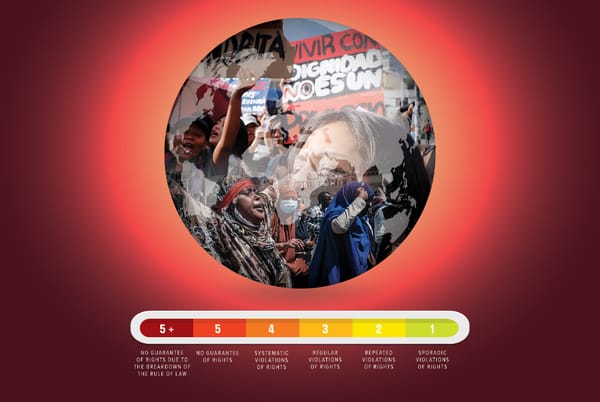
Earlier this month, the BC Employment Standards Coalition (ESC), a grassroots initiative of workers’ rights advocates and organizations in British Columbia, released a report called “Justice Denied: The Systemic Failure to Enforce BC Employment Standards.” The report “documents the failures of the BC Employment Standards Branch, an agency of the BC Ministry of Labour, to effectively and efficiently enforce the Employment Standards Act.”
The ESC report documents failures with employment standards enforcement that mirror evidence from across provinces in Canada. It also makes a series of recommendations to address these problems that labour activists, unions and advocates will find helpful no matter where they live and work.
Included in the report are also several harrowing stories of workers who experienced significant employment rights violations, attempted to file complaints and resolve their issues through the Employment Standards Branch, and, whether because of lack of staff or resources, incompetence, or neglect, were unable to secure remedies.
Employment standards legislation sets out the minimum conditions of work, including such things as the minimum wage, hours of work regulations, job-protected leaves, severance and termination rules, and vacation and holiday pay and leave.
As union density has declined in the private sector and precarious forms of employment have spread, a growing share of the workforce is dependent on employment standards for their primary source of legal protection on the job. Without a union and a collective agreement, employment standards legislation is all that remains.
In B.C., more than 80 per cent of workers aren’t union members, and depend on the Employment Standards Act as their only protection around wages and other basic working conditions at work. The problem — in B.C. and across the country — is that employment laws are weakly enforced and violations of workers’ rights are widespread and systematic.
In the early 2000s, the B.C. Liberal government made significant changes to the employment standards regime in the province, not only by weakening employment protections under the Employment Standards Act (ESA), but also by defunding and reorienting the Employment Standards Branch’s (ESB) inspection and investigation practices.
As in Ontario, there has been a long-term shift in B.C. away from proactively inspecting employers thought to systematically violate workers’ rights, toward relying almost entirely on workers coming forward with complaints. It’s well-known that employer law-breaking is widespread; the question is: How will these violations be detected and punished? Will the state devote resources to actively uncovering violations and punishing law-breaking employers, or will it depend on self-advocating workers to bring violations to light through complaints? By and large, as the ESC documents, the B.C. Ministry of Labour and the ESB have depended on the latter strategy, despite its lacklustre track record.
Beginning in 2001, the government cut the ESB’s budget by 57 per cent over 10 years, reduced staff by more than half and made it much more difficult for workers to file complaints. Under-resourced inspectorates take longer to process workers’ complaints, and usually see the percentage of complaints that get resolved drop off dramatically. Delays in complaints resolutions can also result in employment standards officers advising workers to settle for less than what they’re owed in the hope of resolving cases more quickly.
In another move similar to changes in Ontario, the B.C. Liberals required that workers complete a “self-help” step, which involved trying to first resolve the issue with the employer before filing a complaint with the ESB. Because many workers lack the structural power to individually stand up to their employer, “self-help” requirements tend to deter workers from lodging official complaints when they experience a violation at work.
The accumulation of these changes in B.C. constituted a signal from government to employers that the ESB would no longer be concerned with ensuring workers’ rights. Predictably, workers complaints declined by 67 per cent between fiscal years 1997-98 and 2002-03. As the report makes clear, employment recalcitrance has become a structural feature of business in the province — as is the case throughout Canada.
Alongside resource cuts, the B.C. government also scaled back the collection activities of the ESB throughout the early-to-mid 2000s. As a result, millions of dollars in wages that were determined to be owed to workers went uncollected. The report indicates that between 2013 and 2017, the ESB failed to collect $14.7 million in stolen wages. Put another way, over a four year period employers in B.C. effectively siphoned off nearly $15 million in free labour while the provincial government and its employment standards enforcement arm looked the other way.
The report also finds that there are lengthy delays in the resolution of the complaints that do make it to the desks of enforcement officers, while the ESB prioritizes administration over protecting workers’ rights. Like most other labour inspectorates, the ESB relies on a complaints-based system, which depends on workers coming forward with complaints against employers, and spends little time doing proactive inspections of businesses to ensure compliance with labour laws. This results in employees facing considerable barriers in having their complaints addressed. In fact, the vast majority of employment standards violations don’t result in a complaint, either because workers fear retaliation from their boss if they complain or because they are unsure how to file complaints and navigate often complex bureaucratic employment law systems. These issues are exacerbated for workers with precarious citizenship status or for those whose first language isn’t English.
The move away from performing proactive inspections as an integral part of employment standards enforcement is especially troubling in light of the growth of employee misclassification, whereby employers falsely claim their workers are self-employed “independent contractors” and therefore not entitled to employment standards protections and other social benefits. Misclassified workers are unlikely to file complaints challenging their employment status. Therefore, labour inspectorates need to devote time and resources to proactively inspecting sectors and businesses where misclassification is known to be widespread. The failure to prioritize this proactive work leaves vulnerable workers without employment law protections and with little recourse.
The Coalition’s report further documents employer bias in Branch practices and procedures, which frequently shifts the onus onto workers to advocate for themselves and demonstrate the worthiness of their cases. Additionally, the ESB faces budget shortfalls and staffing inadequacies that make effective enforcement of the ESA all but impossible — a familiar story across provincial labour inspection regimes.
Despite the election of an NDP government in B.C. in 2017 and some promising reforms to the ESA and other labour laws, the provincial labour inspectorate still depends on a reactive, complaints-based system that does an extremely poor job of ensuring workers’ rights. In fact, pro-labour reforms to the ESA have in some ways made the problem of an under-resourced inspectorate worse. New and better labour standards can result in an uptick in violations as employers — either out of ignorance or malice — adjust to or break the new, improved law. Without a beefed up inspection and enforcement regime, these violations can either go undetected or unresolved in the instances where violations result in formal complaints. Thus far, the NDP’s financial commitments haven’t been commensurate with its promises to make the ESB a modern and effective labour enforcement agency.
Helpfully, the Employment Standards Coalition’s report makes several recommendations to improve employment standards enforcement in B.C. These are incredibly sensible, evidence-based calls to action, which are applicable to labour and employment law regimes across Canada.
First, the ESC calls for annual funding increases to make the ESB’s budget adequate to the crisis in employment standards enforcement in the province. They call for a return to prioritizing proactive inspection work, particularly in industries where misclassification is a growing problem — especially in the so-called “gig economy.”
As the report indicates, a greater focus on shortening complaints processing time while collecting monies workers are owed is also needed. In part, this could be done by establishing set timelines for handling various stages in the complaints investigation process and making these publicly available to workers.
Last, the ESC rightly points out what many labour scholars have been pointing out for some time: employers who break the law need to face serious punishment. As it stands, in most cases, fines — if they exist at all — for employers who violate workers rights are so meagre that bosses consider them a minor cost of doing business. Small monetary penalties and weak enforcement effectively incentivize employer law-breaking. Deterrence through meaningful financial penalties is the only way to make sure trampling over workers’ rights isn’t a good business strategy.
The Employment Standards Coalition’s report documents serious problems with the labour enforcement regime in B.C. While the report proposes important improvements that could promote and protect workers’ rights, ultimately the best way to do this is to expand access to unionization and collective bargaining. Neoliberalism and labour market “flexibility” have made a growing proportion of workers depend on weakly enforced employment standards legislation. The job of the labour movement is to reverse this trend by organizing more workers into unions so that workers can fight collectively for themselves.







